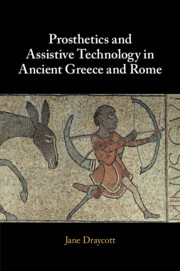Book contents
- Prosthetics and Assistive Technology in Ancient Greece and Rome
- Prosthetics and Assistive Technology in Ancient Greece and Rome
- Copyright page
- Dedication
- Contents
- Figures
- Tables
- Acknowledgements
- Abbreviations
- Introduction
- Chapter 1 Extremity Prostheses and Assistive Technology
- Chapter 2 Facial Prostheses
- Chapter 3 Hair Prostheses
- Chapter 4 Design, Commission, and Manufacture of Prostheses
- Chapter 5 Living Prostheses
- Conclusion
- References
- Index Locorum
- Index
Conclusion
Published online by Cambridge University Press: 08 December 2022
- Prosthetics and Assistive Technology in Ancient Greece and Rome
- Prosthetics and Assistive Technology in Ancient Greece and Rome
- Copyright page
- Dedication
- Contents
- Figures
- Tables
- Acknowledgements
- Abbreviations
- Introduction
- Chapter 1 Extremity Prostheses and Assistive Technology
- Chapter 2 Facial Prostheses
- Chapter 3 Hair Prostheses
- Chapter 4 Design, Commission, and Manufacture of Prostheses
- Chapter 5 Living Prostheses
- Conclusion
- References
- Index Locorum
- Index
Summary
This chapter concludes the monograph, emphasising how important the study of ancient assistive technology such as prostheses and aids is for achieving a fuller understanding of the lived experiences of the impaired and disabled in antiquity, and considering how much the objects themselves can tell us about their users. It reiterates that the assistive technology that has survived from antiquity has done so because the objects were included in the tombs and graves of their users, which indicates that they were viewed as part of the individual's body rather than separate from it.
- Type
- Chapter
- Information
- Prosthetics and Assistive Technology in Ancient Greece and Rome , pp. 169 - 175Publisher: Cambridge University PressPrint publication year: 2022

